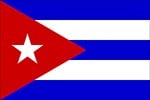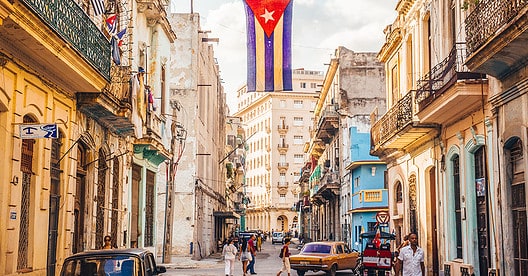Includes historical data for Cuba’s Gross Domestic Product growth, debt-to-GDP ratio and more, as well as information on trade, banking and financial sector leadership.
Post-Independence Economic Malaise
Cuba’s political structure remains deeply influenced by the 1959 revolution, maintaining the one-party Communist system to this day. Leadership transitioned from Fidel to Raúl Castro in 2006, and then to Miguel Díaz-Canel in 2018. This Caribbean island of about 11 million people could have immense economic potential, particularly in sectors such as tourism, mining and agriculture. Additionally, it boasts a skilled and inexpensive labor force, superior healthcare and educational sectors, and low crime and corruption levels. A cooperation agreement with the European Union further enhances trade opportunities and job creation prospects for the local economy.
Still, Cuba remains plagued by several vulnerabilities. A monetary reform in January 2021 failed to unify the dual currency system and revise prices, leading to hyperinflation, eroding savings and devaluing salaries, and causing shortages of essential supplies. The Covid-19 pandemic and U.S. sanctions have exacerbated the economic downturn. Other weaknesses include low work productivity and a large informal sector, an insufficient degree of investment in infrastructure and in the modernization of the economy, and inefficient administrative processes. As a result of its political isolation, Cuba is also strengthening its ties with non-Western nations such as China and Russia.
Macroeconomy & Sovereign Data
| Type of Government | Communist state |
|---|---|
| Capital | Havana |
| Sovereign Ratings |
S&P: Not rated Moody’s: Ca Fitch Ratings: Not rated |
| Total Population | 11.1 million |
| Median Age | 41.6 |
| Adult Per Capita Income (PPP) | 7,186 |
| Total GDP (2023) | 140.6 billion |
Cuba GDP & Economic Overview
Trade & Investment
| Total Exports | USD 1.9 billion (2023) |
|---|---|
| Leading Exports |
Tobacco Nickel Zinc Ore Liquor Raw Sugar |
| Total Imports | USD 8.9 billion (2022) |
| Leading Imports |
Poultry Wheat Milk Plastic Products Soybean Oil |
| Source: | World Integrated Trade Solution |
Most Recent Content
Cuba
Cuba Leading Companies
| Cuba Petróleo Unión | Oil & Gas Exploration & Production |
|---|---|
| Cubana de Aviación | Airlines |
| Cubatabaco | Consumer Staples, Tobacco |
| Modelo Brewery | Consumer Staples, Brewers |
| Havana Club | Consumer Staples, Distillers |
| Etecsa | Telecommunication Services |
| Habaguanex | Hotels, Restaurants & Leisure |
Major Trade Partners — Import
| Spain | 23% |
|---|---|
| China | 12% |
| Germany | 5% |
| Portugal | 4% |
| Switzerland | 4% |
Source: World Integrated Trade Solution
Major Trade Partners — Export
| China | 40% |
|---|---|
| Spain | 13% |
| Germany | 5% |
| Portugal | 4% |
| Switzerland | 4% |
Source: World Integrated Trade Solution
Global Finance Rankings & Awards
Data Sources:
World Bank
Oficina Nacional De Estadística E Información República de Cuba
United Nations Economic Commission for Latin America and the Caribbean (ECLAC)
United Nations Data Portal Population Division
World Inequality Database
The World Trade Organization







